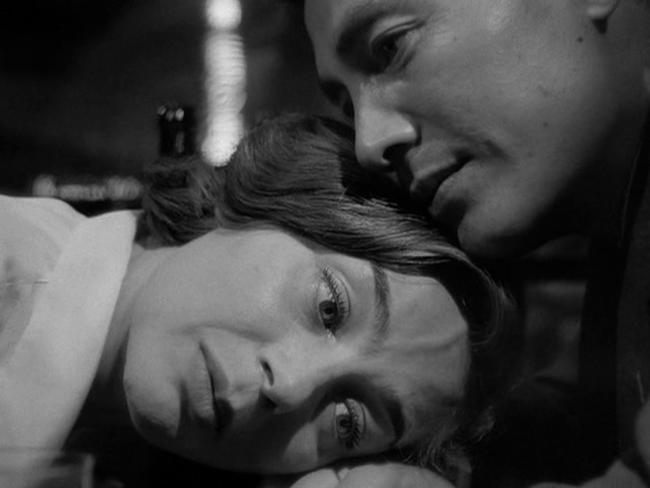
A love founded on treacherous memory, on identification with monstrousness, on a fascination with strange enemies compounded by the torment of the familiar. The young woman at the centre of 1959's Hiroshima mon amour might be said to love in this way; some might dismiss her passion as delusional, founded on a masochistic fetishisation. Doing so would seem a mean, ugly thing to do after watching this film of almost relentlessly exquisite compositions, depicting the passions aroused by an increasingly desperate search for intrinsic meaning in affection.

To call the first segment of the film bold would be an understatement. Footage of two lovers, their faces not yet shown, in bed, wrapped in each other's arms is intercut with footage from a Hiroshima museum devoted to victims of the atom bomb and with stark, documentary style footage of real people who suffered after effects. This includes shots of women who have lost their hair and children who have suffered horrendous, disfiguring wounds.

We also see children who were born with physical deformities as a result of their mothers' exposure to radiation. The film's protagonist, an unnamed woman played by Emmanuelle Riva, talks about women who risked giving birth to "monsters". Undoubtedly a cruel word to be attached to these children but the woman's choice in the term accurately reflects the reality faced by these children, a reality that would be repressed by more sanitised language. It conveys something of the pain these kids will face for their entire lives.

And Riva's character certainly speaks with affection. When she passionately declares her love for Hiroshima after this footage, one can hardly blame her, the natural human response to such suffering would be heartbreak. But her identification goes beyond that as we learn more about her own past. Director Alain Resnais gives us a film with gorgeous cinematography by Michio Takahashi and Sacha Vierny both of Hiroshima and of the protagonist's home town of Nevers in France.

They find strikingly strange trees and seem to effortlessly construct shots of horizontal layers of light and dark which evoke clear meaning in how they draw the eye. The German soldier Riva's character loved in her youth, during the war, isolated in dark wilderness or against bright, washed out grass. Or the two of them dwarfed by a massive hole torn in a brick wall.

The town punishes the girl's sexual indiscretion by shaving her head, giving her physical attributes of monstrousness to reflect the moral condemnation they've given to her actions. A visual cue to inspire the instinctive repulsion already felt by those who hate her for loving one of the enemy.

The action occurring in the film's present concerns an affair between the woman and an unnamed Japanese man played by Eiji Okada. Physical affection is a big part of this film's visual language but anyone familiar with Japanese films of the 50s will be struck by how unrestrained Okada's character is in holding her and even kissing her in public--public displays of physical affection being taboo in Japan. Even so, she identifies him as a personification of Hiroshima and the imagery of the two physically connecting is important for the juxtaposition of reality against possibly inaccurate impression.

In that beginning segment, she keeps talking about the things she experienced or saw at the museum only to be repeatedly interrupted by him so he can tell her, no, she really experienced nothing, she really saw nothing. When he asks her to describe what it was like in France when she learned of the atomic bombs falling on Japan, she describes mainly amazement and some relief that the war had ended, a sorrow for the ones who died, and then a sympathy that gradually faded over the years. She describes this dispassionately as though wanting to rebuke herself. She also talks about the desperation she feels at gradually forgetting details of her German lover, she talks about the oppressive feeling of time passing while knowing he's dead. The film acutely conveys the pain of this experience and I was reminded of Tokyo Monogatari.

We learn little about Okada's character beyond his obsession with her. We learn he was a soldier for Japan during World War II but we don't get any psychological insight into him on the level we get into her except perhaps the indication that its her strange psychology that draws him. Emmanuelle Riva gives a tremendous performance and it's easy to see how her passion and personal dilemma would inspire love.

No comments:
Post a Comment